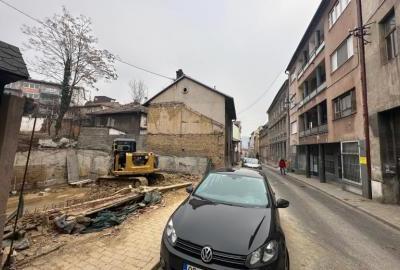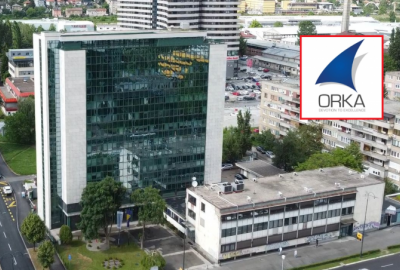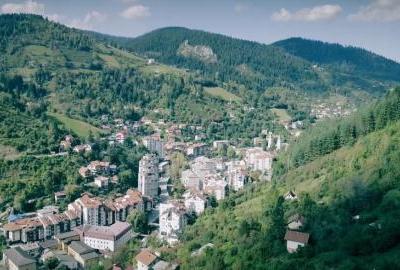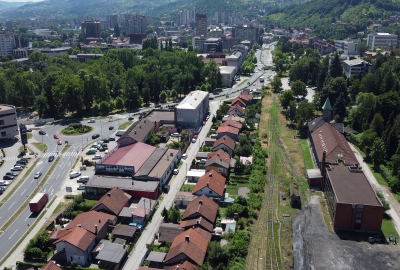Žurnal in English
FORESTS TARGETED BY THE MAFIA: Multi-Million Dollar Crime Involving Illegal Loggers, Interest Groups, and Politics
The private forest "Repišta" in Vučija Luka has been devastated. The majority owner, Milka Popović, reported everything to the police and prosecutor's office, but no action has been taken on these complaints for two years. The situation is no better in other parts of Bosnia and Herzegovina. Most illegal logging occurs in areas where local authorities or relevant inspections lack sufficient resources for control, says Azra Šehić-Kustura. The forestry sector is considered one of the most unregulated fields in the country’s economy, and HNK (Herzegovina-Neretva Canton), where we’ve witnessed 15 years of anarchy in the forestry sector, is deemed one of the most critical areas, according to the Foundation "Atelier for Social Change." Environmental activist Safet Kubat believes that illegal and unplanned logging is also linked to landslides.
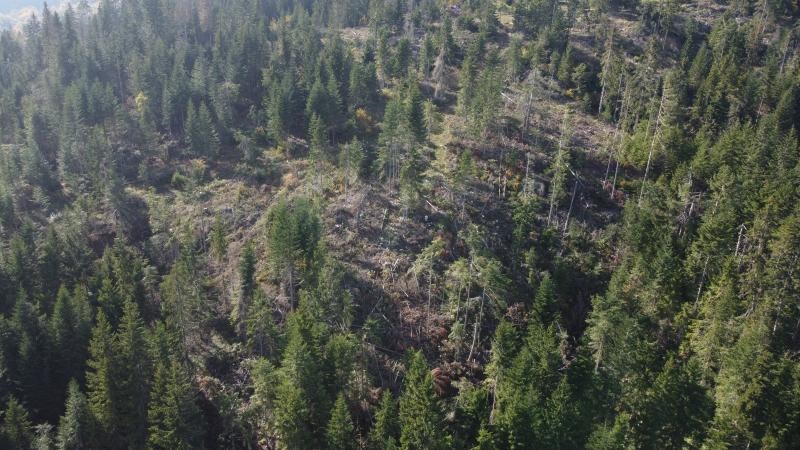
Milka Popović from Istočno Sarajevo reported forest theft in her private forest, "Repišta", located in Vučija Luka, two years ago, where she is the majority owner. According to the report, held by Žurnal, 52 spruce trees with an estimated market value of about 30,000 KM were cut down and removed.
She discovered the theft entirely by accident. In July 2022, while walking through the forest with her children, they noticed that a large number of century-old trees had been cut down, and young trees had been toppled. Milka Popović told Žurnal that, at first glance, there was no indication of devastation because the perpetrators left a "curtain" of two or three rows of trees along the road, intending to hide the extent of the logging.
Century-Old Trees Destroyed
“These were century-old trees. Additionally, a vast number of young trees were toppled just to cut down and extract the profitable ones. Everything unprofitable, including young and decayed trees and branches, was left as waste. We immediately reported the case to the forester, but he replied sarcastically, suggesting we should guard the forest ourselves and saying, ‘Well, cousin Tadić came by, so it’s well protected’ ”, recounts Milka Popović, majority co-owner of the century-old forest until 2022, now a co-owner of barren land littered with forest waste in the Vučija Luka area.
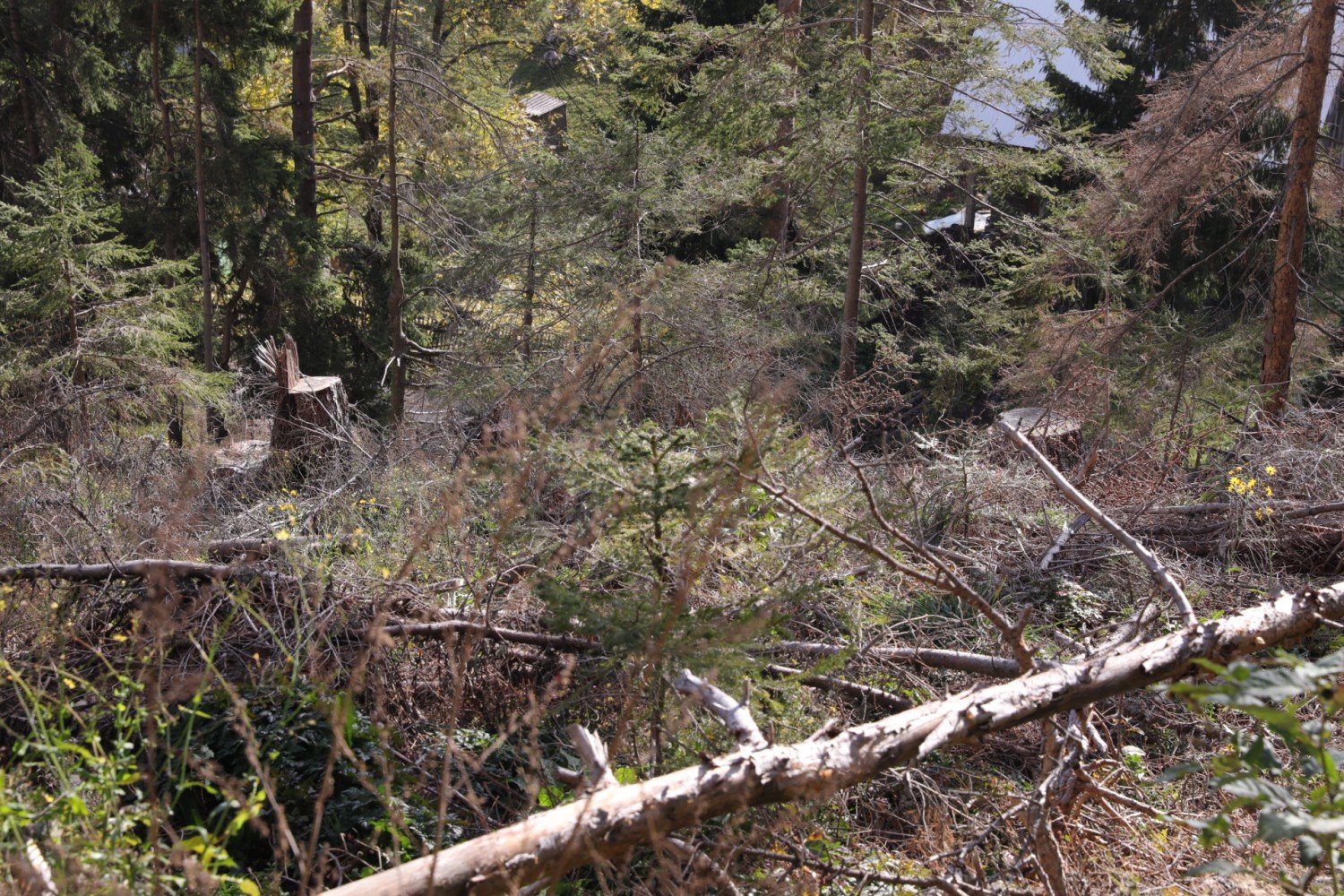
They subsequently reported the case to the District Public Prosecutor’s Office in Istočno Sarajevo. After some time, Popović says they received notification from the assigned prosecutor that an investigation would not be initiated due to a lack of evidence. However, when Žurnal inquired, the District Prosecutor’s Office responded that a case had been opened, measures and actions were being undertaken to establish all circumstances surrounding the crime, and that the acting prosecutor would make further decisions once all facts and circumstances were clarified.
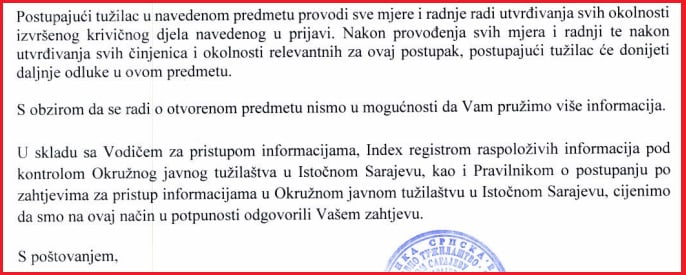
However, despite Milka Popović’s report, nothing concrete has been done over the past two years, and the logging has continued. According to Popović, thousands of trees worth hundreds of thousands of BAM have been cut down to date.
“It’s not just financial damage to the co-owners. This is harmful to the entire community; the whole ecosystem has been destroyed. Where birds once sang, and roe deer and other wildlife lived, there is now silence, no life left. Over the past two years, I have repeatedly reported this to the Police Station in Istočni Stari Grad. At first, I reported unknown perpetrators, but later, based on the information I gathered, I listed the names of those responsible. Yet I never received a response to any letter. I also reached out to the public company ‘Šume Republike Srpske’, but they, too, provided no response. None of the relevant institutions—prosecutor’s office, police, forestry management—took any action, and in just two years, the century-old forest spanning an area of three to four stadiums has been completely logged", emphasises Milka Popović.
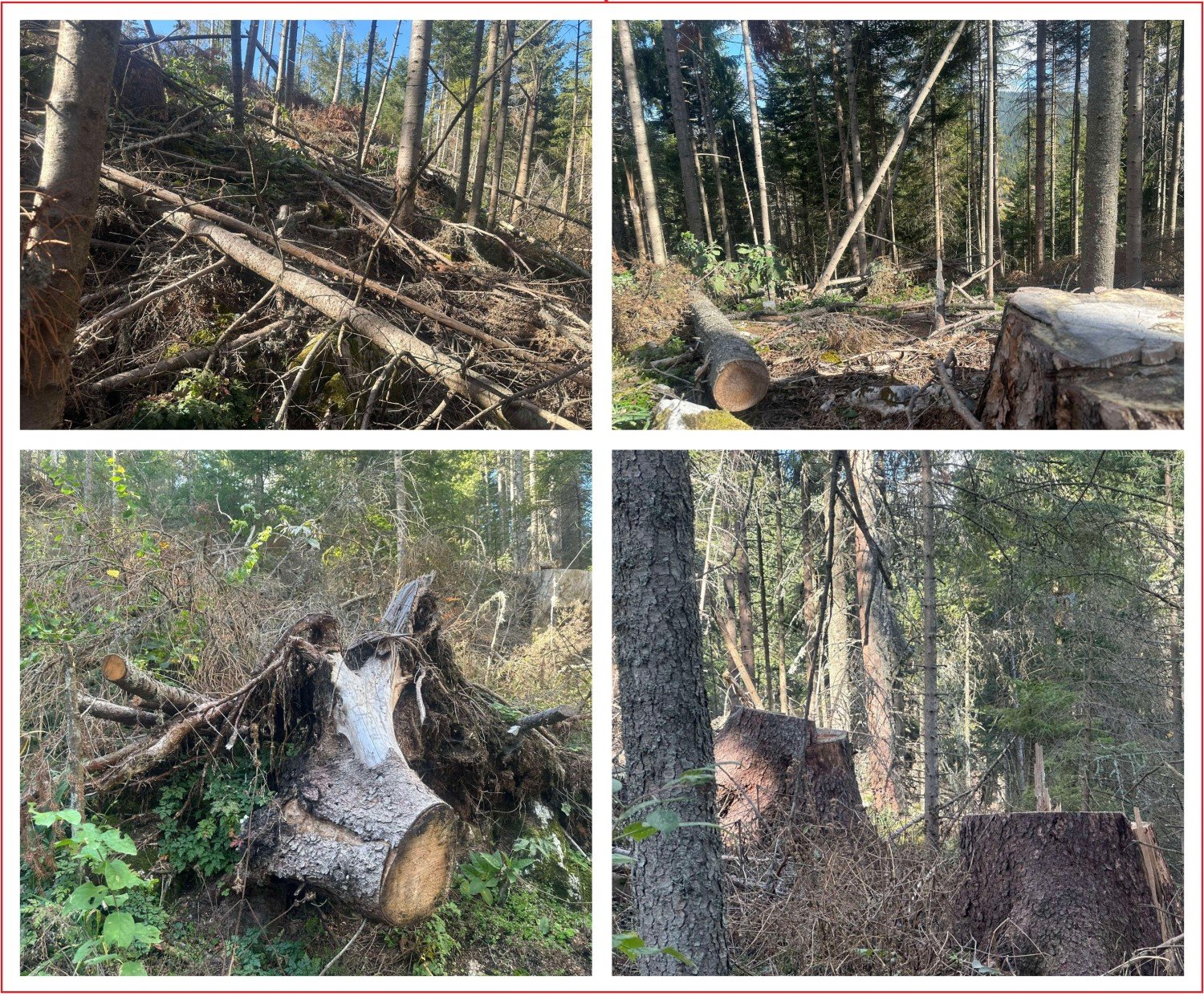
The RS Ministry of Internal Affairs responded to Žurnal's inquiry, stating that the Istočni Stari Grad Police Station acted on the report and forwarded the report of measures taken to the District Prosecutor's Office for further action.
We also sent a series of questions to the email address of the public company "Šume Republike Srpske", but they did not respond before this article was finalised.
“The ‘Repišta’ forest in Vučija Luka, in the municipality of Istočni Stari Grad, as listed in the land registry, is no more. There’s no hope that it will regrow in the next two hundred years. It’s been permanently destroyed!” says Milka Popović, disheartened.
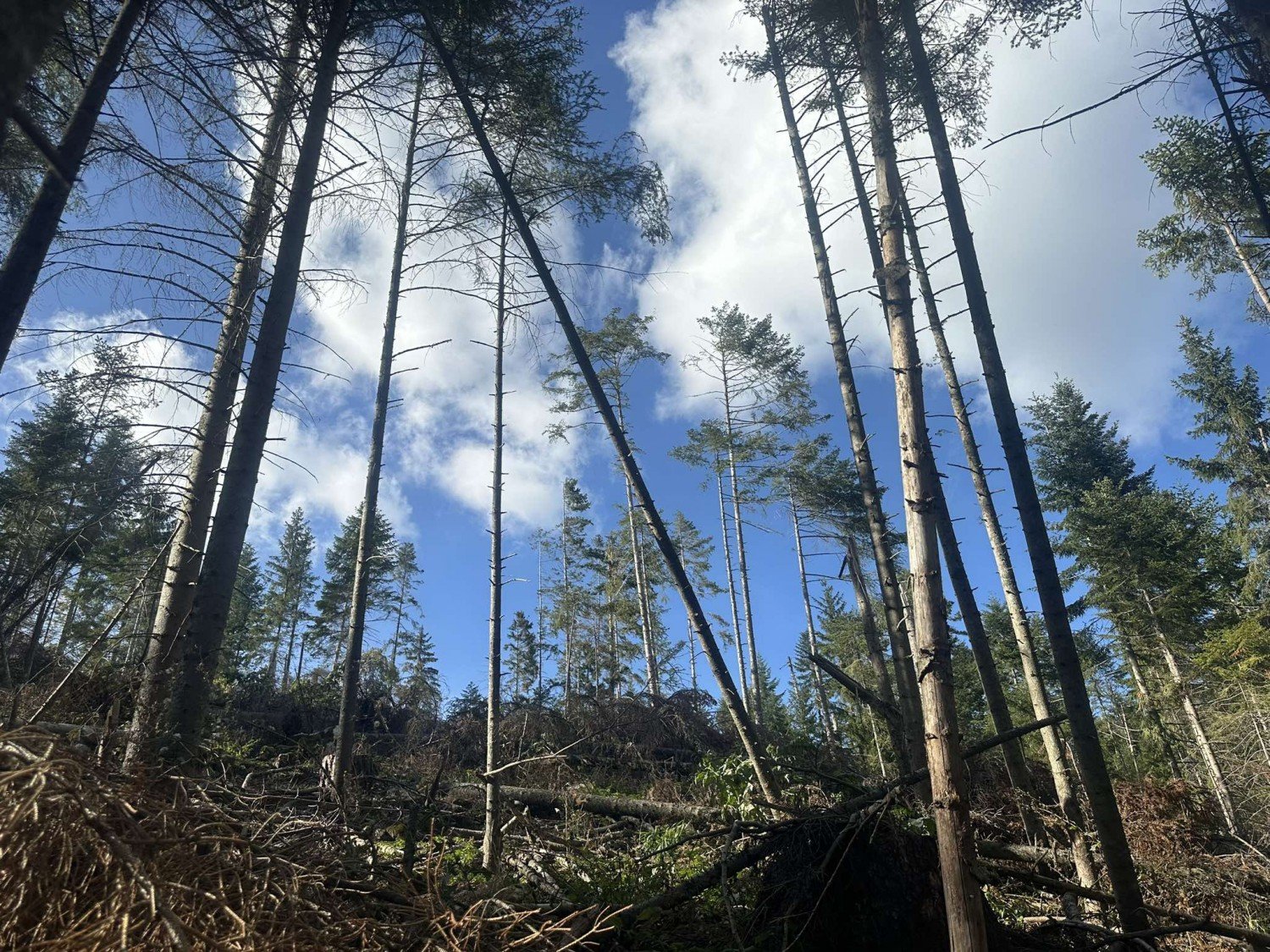
LOW PERCENTAGE OF PROTECTED AREAS
Forests cover 53 per cent of Bosnia and Herzegovina’s territory, putting the country above the European average in this regard, environmental activist Safet Kubat points out. However, this forest coverage raises questions about the current state of forest protection. To fully understand the issue, Kubat suggests, it’s essential to look back at history.
“Back in the Ottoman period in Bosnia, when consular offices were being established and Konrad A. was mapping the forests of BiH, he described the people as self-destructive and the forests as unreal. This portrayal, along with geological mapping, played a crucial role in Austro-Hungary’s decision to take control of Bosnia in 1878", says Kubat.
He further explains that massive clear-cutting of forests occurred during the Austro-Hungarian period and even before, for charcoal production, especially in Vareš.
“In addition to the historical context, another major issue for our forests is the very low percentage of protected areas, which stands at just 4.1% in BiH, according to the World Bank (2023). This low percentage of protected land provides space for both legal and illegal logging—for the construction of apartments, vacation homes, buildings, highways, or mining. We’re talking about hectares of forest, along with illegal logging by timber thieves. It’s a complex mix", Kubat emphasizes.
.jpg)
Data on illegal logging in Bosnia is not always precise or readily available, but it is known that illegal logging most often occurs in mountainous and forested areas, explains Azra Šehić-Kustura, PR assistant at the Aarhus Center in BiH.
“The highest volume of illegal logging is recorded in areas where local authorities or inspections lack the resources for control or where corruption enables such activities. Various environmental organizations, like the Aarhus Center in BiH, regularly highlight these practices and the need for improved monitoring", says our interlocutor.
THE SITUATION ON PAPER VERSUS REALITY ON THE GROUND
The problem lies in the absence of a legal framework to protect forests at the entity level.
“For example, the Herzegovina-Neretva Canton is the only canton without its own Forest Law, yet it has four forestry companies that freely manage and operate within the forest as they please. There’s no monitoring, nor can we truly know the state of the forests in this canton. It’s clear that there is no political will to address this problem because, in this way, everyone can take their share of the profit", says Azra Šehić-Kustura.
The forestry sector is considered one of the most disorganized areas in the domestic economy, and HNK, where there have been 15 years of anarchy in forestry, is seen as one of the most critical regions, according to the Foundation “Atelier for Social Change.”
According to activist and Foundation director Lejla Kusturica, they are often advised not to use the word “anarchy” to describe the state of the forestry sector in this administrative unit, as it may seem too harsh. However, the Foundation questions how else to describe a situation where, since 2009, there hasn’t been a single valid fundamental regulation for the forestry sector—neither at the state, entity, nor cantonal level. The organization of forest management is undefined and is carried out by three different companies; the cantonal forestry administration does not function; illegal logging wipes out hundreds of trees daily, including endemic Munika pines; and forest land is appropriated freely by anyone and anywhere.
“Is that anarchy in the broader sense of the word? As far as we’re concerned, it definitely is!” claims Lejla Kusturica.
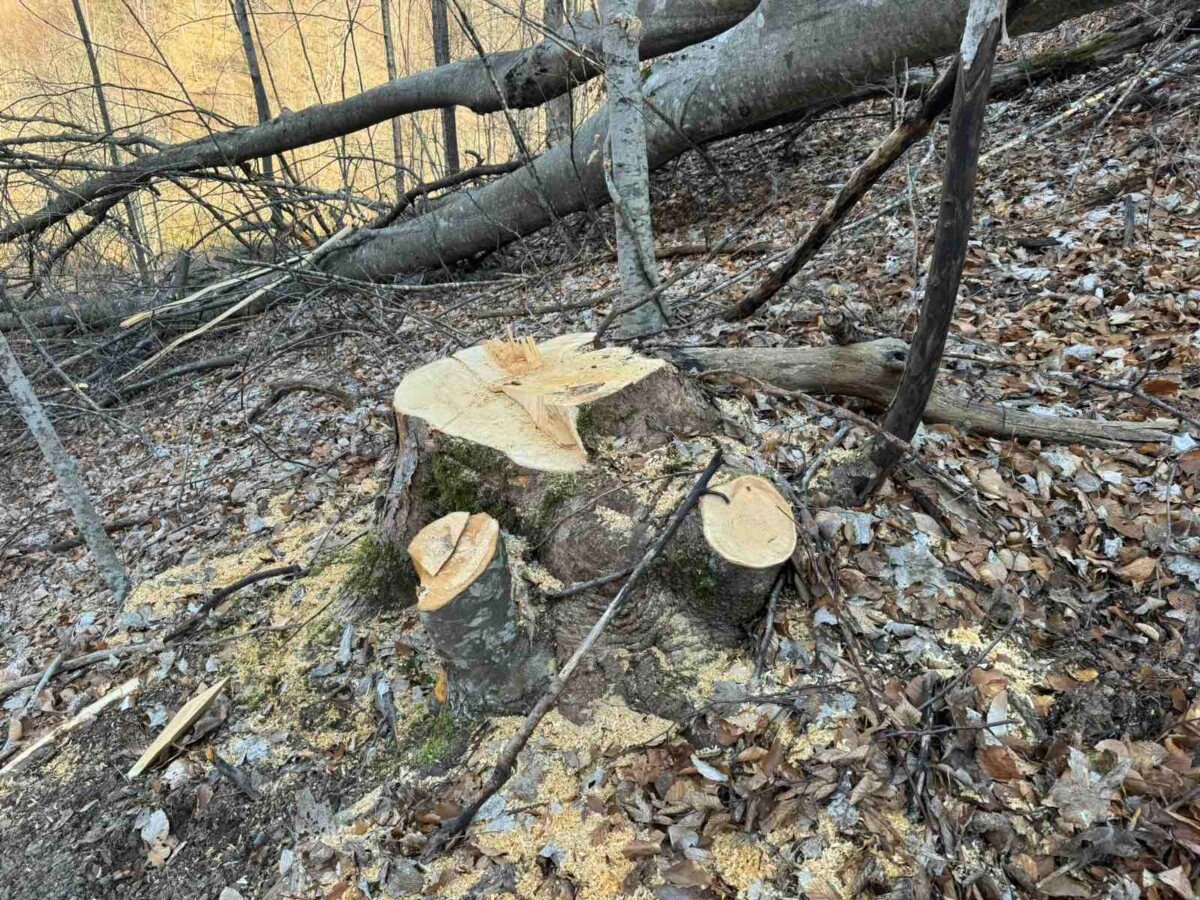
According to Kusturica, it’s often claimed in public discourse that the current situation in the Herzegovina-Neretva Canton (HNK) is a result of the lack of political agreements between the two main ethnic groups, supposedly to protect “national interests”—which she describes as a blatant lie.
“Under the guise of ‘protecting national interests,’ multimillion-dollar deals are being made between large-scale illegal loggers, sawmill owners, and associated interest groups on one side, and political representatives on the other. The collateral damage in this story is the Herzegovinian forests, especially in the northern parts of the canton, which are being degraded and destroyed day by day", Kusturica explains.
In 2023, the Atelier for Social Change Foundation (ACT) collected data on the scale of illegal logging of state forests—forest theft across Bosnia and Herzegovina. Their findings revealed that in 2020, 2021, and 2022, an average of 36,000 cubic meters of illegally logged wood was documented "on paper" in the Federation of BiH (FBiH).
“Estimates suggest that the actual annual volume of illegal logging in FBiH is around 1,000,000 cubic meters of wood, clearly indicating systemic issues. When it comes to HNK, the situation is especially severe. Throughout 2022, the Cantonal Forestry Administration recorded only 149 cubic meters of illegally logged wood. Based on field data, we assert that this volume is actually logged in less than a week in just the Jablanica and Konjic areas", Kusturica emphasizes.
She added that similar, though slightly less severe, examples can be found in many other parts of the country. However, FBiH remains particularly problematic, as it has lacked a valid Forest Law for almost 15 years. The previous law was declared unconstitutional in 2009, and a new one has yet to be adopted.
Lejla Kusturica states that the entity of Republika Srpska (RS) has a valid entity Forest Law, but many of its provisions are merely dead letters on paper when it comes to practical implementation.
The cantons, except for the Herzegovina-Neretva Canton (HNK), have meanwhile adopted cantonal regulations for the forestry sector, which are not harmonized.
CATASTROPHE IN JABLANICA
Let us recall the catastrophe in Jablanica that claimed 19 lives. Activists indicate that illegal quarries and illegal logging significantly contributed to the disaster. The Foundation states that experts and scientists will determine all the causes that led to the floods and landslides with catastrophic consequences in several local communities, but they are quite certain that uncontrolled logging is one of the factors that contributed to and/or intensified the destructive power of these disasters.
By “storing” large amounts of water in their root systems, trees reduce water retention on and in the soil, which consequently decreases the likelihood of landslides. This was evidenced during a visit to the vicinity of Buturović-Polje near Konjic, where numerous smaller landslides were halted by groups of tall trees. The aforementioned illegal activities in the forestry sector, often accompanied by strong ties between political elites, corrupt forest guards, and large-scale illegal loggers, inflict significant damage on Bosnian forests. Such disasters serve as a lesson from nature and the clearest signal that we must change our relationship with forests, which are the most complex and dominant ecosystems on planet Earth", concludes our interlocutor.
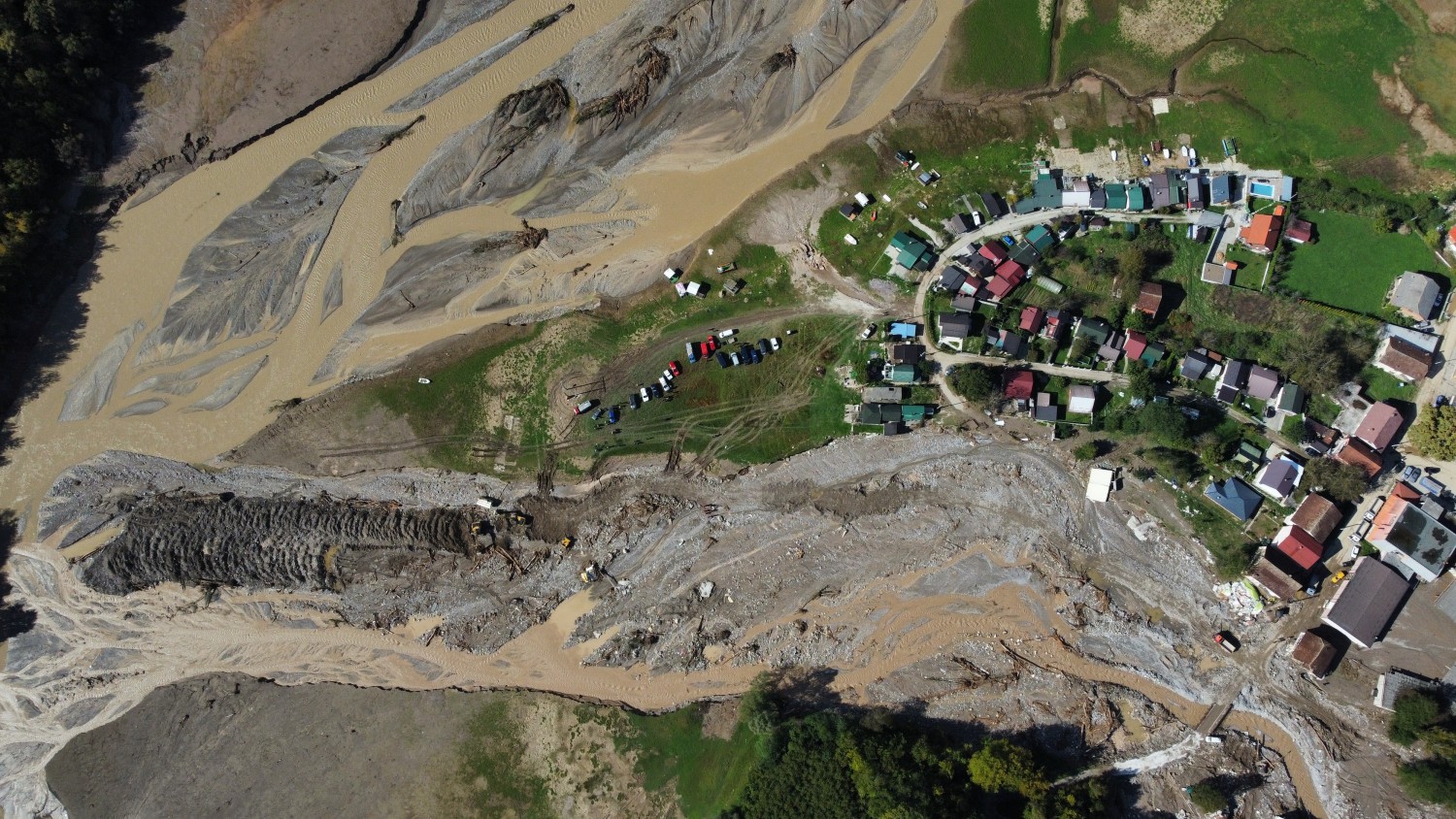
Environmental activist Safet Kubat also asserts that it is the responsibility of the authorities, inspection, and prosecutor’s office to investigate the case in Jablanica.
“However, speaking generally, it’s clear even to a bird in a tree that one is cutting the branch they are sitting on. Jablanica is not the first case; about a decade ago, we had similar scenarios in the areas of Nemila (Zenica) and Željezno Polje (Žepče), just without human casualties", Kubat reminds us.
According to him, illegal and unplanned logging can certainly be linked to landslides.
“As one of the survivors from the village of Zlate said, ‘My Safet, it’s not for nothing that the elders warned not to cut down the forest above the village.’ It’s a combination of weather conditions, logging, and unprofessional forest management. Most scientists agree that the hydrology of an area changes after the forest cover is removed, but it’s essential to allow the state to investigate. Among other things, forests function on the principle of sponge and water absorption. After we remove the trees, the soil becomes saturated with water, leading to landslides, especially when precipitation exceeds expectations", says Kubat.
DEVASTATION OF BH. MOUNTAINS
Azra Šehić-Kustura emphasizes that uncontrolled and illegal logging in areas such as Bjelašnica, Jahorina, Trebević, and throughout Bosnia and Herzegovina can lead to serious ecological, climatic, and socio-economic consequences.
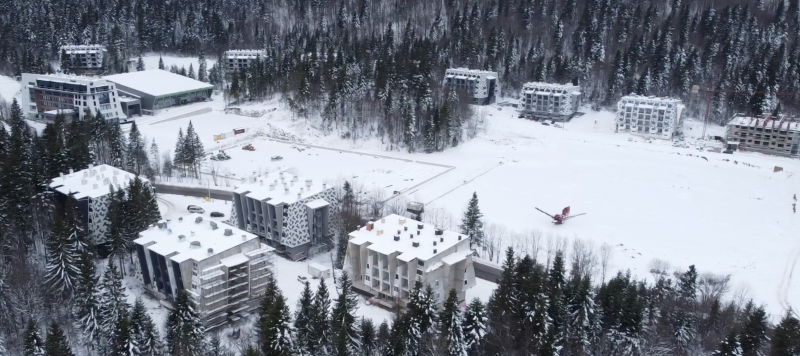
“The loss of forests contributes to soil erosion, landslides, a reduction in biodiversity, and negatively impacts water resources and the climate. Deforestation can also lead to higher carbon dioxide emissions, contributing to global warming. In the long run, these negative effects can diminish the quality of life for local communities, reduce the tourism potential of these areas, and affect the health of ecosystems that depend on healthy forests", says our interlocutor.
Earlier, Žurnal warned about the devastation of forests on certain mountains in Bosnia and Herzegovina. On Bjelašnica, the forest has been cleared and destroyed for the construction of apartments, leading to an investigation by the KS Prosecutor's Office against the Mayor of the Trnovo Municipality, Ibro Berilo, and several others who were arrested in August of this year. Among other things, they are suspected of long-term land grabbing and illegal logging in the Bjelašnica area. As we have reported several times before, illegal deforestation, the issuance of illegal building permits, evasion of obtaining permits from the relevant cantonal ministries, and the grabbing of state property on Bjelašnica has been ongoing since 2013.
We also wrote that new buildings are planned to be constructed on Jahorina, including residential-business and hospitality facilities, up to ten stories high, which will result in the cutting down of a large amount of forest, either already or soon. Žurnal has been monitoring the adoption of the new, revised Regulatory Plan for the SRP Jahorina in the Trnovo municipality. In this case, the Law on Environmental Protection of the Republika Srpska has been violated, which specifies that plans, programs, and foundations in the area of spatial and urban planning must undergo a strategic environmental impact assessment. This decision is made by the competent authority, in this case, the Trnovo Municipality, and is delegated to a professional institution – the Unis Institute. However, the Trnovo Municipality was satisfied with the Unis Institute's explanation that there would not be significant environmental impacts and that the study was unnecessary.
The draft plan presented last year for Jahorina includes plans for new buildings, residential-business and hospitality facilities, up to ten stories high, which will result in the cutting down of a significant amount of forest, either already or soon.
Žurnal has also reported on the rapid construction taking place on Trebević, where buildings are continuing to be erected without legal permits and without any obstacles. Activists have long warned that Trebević is at risk of destruction. As we previously reported, the vision for Trebević held by the Municipality of Istočni Stari Grad involves the construction of accommodation and hotel capacities at Brus, a gondola from Brus to Dobre Vode, and then from Dobre Vode to the mountain peak, as well as sidewalks and promenades leading to Roof Gardens. At the same time, the cantonal authorities plan to build a sewage system, denying any favouritism toward investors while turning a blind eye to the fact that construction on Trebević will impact the Sarajevo Canton. This includes the development of Trebević Hills, for which there has never been a public announcement, nor is it available upon request, regarding whether an environmental impact study was conducted, under what circumstances the Municipality of Istočni Stari Grad issued the construction permit, and who the real owner is, hiding behind a company registered in Dover, USA, and later in the United Arab Emirates.
 WATCH THE MOVIEDevastation of olympic mountains
WATCH THE MOVIEDevastation of olympic mountains
THE CASE OF KONJUH
After 14 years of forest exploitation on Mount Konjuh, the law will finally start to be respected. This is all thanks to the efforts of activists from the "Karton Revolucija" movement, along with citizens who signed their petitions. After a long struggle that felt like another futile battle against windmills, the government of Tuzla Canton has finally taken concrete steps.
Adi Selman from the "Karton Revolucija" movement reminds us that a Protected Landscape of Konjuh was established in 2009, but part of the law stated that in Zone B, which represents more than 75% of the protected area, forestry activities were allowed.
.png)
"In translation, the forests of Tuzla Canton, at that moment, without any consultation with the Protected Landscape or with the municipalities of Banovići and Kladanj, created a forestry management plan that allowed them to do whatever they wanted in the Protected Landscape for ten years. In other words, we ended up with the Protected Landscape of Konjuh where logging and devastation were allowed, and the Protected Landscape did not carry out any activities, not even the legally required ones, such as recording the logged trees on the Kladanj side, or monitoring whether this was being done in accordance with the forestry management plan, and so on", Selman told Žurnal.
The "Karton Revolucija" movement has initiated this fight, and as a result, for the first time in the 15 years since the establishment of the Protected Landscape of Konjuh, video surveillance and a physical barrier will be set up to prevent illegal logging and establish control over the export of forest resources.
"It is important to emphasize that for the last five years, there has been monitoring on the Banovići side, while on the Kladanj side, there has not, which further demonstrates how much timber was exported and the illegal activities that took place on the Kladanj side. Now the government of Tuzla Canton is on the move; they need to expand Zone A, which currently represents 15%, to the most significant parts of Zone B to extend the protection of Mount Konjuh", Selman says.
He recalls that tens of thousands of cubic meters of timber have been exported, that every truck was overloaded, and there was no inspection oversight; all reports submitted were not acted upon.
"We reported to the inspections that timber was being exported from Konjuh after 4 PM, and each time we were told that the inspections were unable to verify this. A significant challenge and problem is that there is no system of protection, meaning there is no control system", Selman concludes.
THE CASE OF ZAVIDOVIĆI
A group of journalists from Bosnia and Herzegovina, the Netherlands, and France worked on a story about illegal logging and the export of timber from Bosnia and Herzegovina to EU countries. The piece titled "Frauds from the Dark Forest: Instead of Mines, 10,000 Cubic Meters of Wood Were ‘Removed' ", authored by Alena Beširević and Ingrid Gercama, was one of those awarded by the Media Development and Analysis Center this year.
Beširević told Žurnal that she and her colleague Ingrid Gercama discovered during their investigation that nearly 10,000 cubic meters of wood, valued at about 800,000 KM, had been cut down in this area. The region spans 70 hectares, approximately the size of 130 stadiums, and was allegedly mined, prompting the public company managing this forest, "ŠPD-ZDK" Ltd. Zavidovići, to issue a tender for logging and demining the area.
"A company named Bučje Ltd. (later MR Wood) applied for the tender, and they paid only 70,000 KM for timber worth 800,000 KM, citing alleged demining costs. Our investigation proved that, contrary to the claims made in the tender, this area had not been mined and that the mine danger actually existed and still exists only in a small area of about two hectares. Furthermore, the initial contract for logging 2,500 cubic meters of wood from the supposedly mined area received four annexes, resulting in MR Wood demining the same area four times, from which they ultimately extracted 10,000 cubic meters of wood at an unrealistically low price that included non-existent demining costs", Beširević recalls.
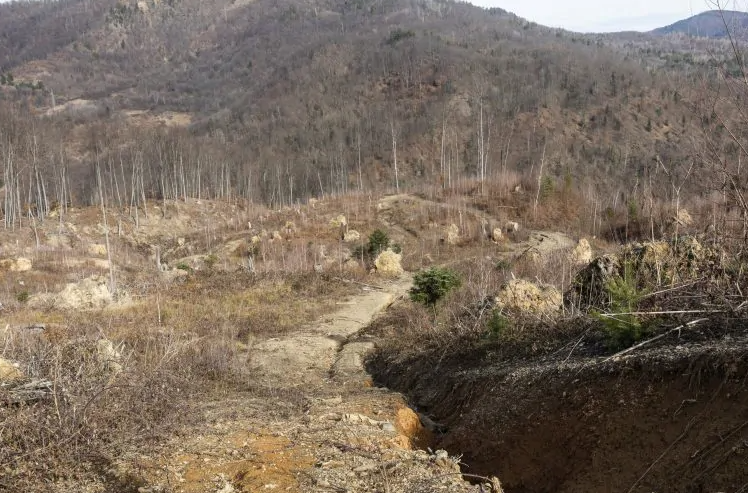
During the investigation, they learned that this case was handled by the ZDK Prosecutor's Office following a report from the Federal Inspection, but an order was issued not to conduct an investigation.
"Although we presented numerous pieces of evidence in the text indicating multiple violations of the law, which were also recognized by the federal inspectors who referred the case to the ZDK Prosecutor's Office, to our knowledge, a subsequent investigation was never initiated, nor has anyone ever been held accountable for these actions", added Beširević.
CHAIN OF RESPONSIBILITY FROM AUTHORITIES TO THE JUDICIARY
In response to the question of who is most responsible for the current state of affairs, Lejla Kusturica states that it is the authorities at various levels who do not want to prepare and adopt comprehensive, harmonized, fair, and modern legal solutions for the forestry sector.
Safet Kubat reminds us that the directors of Forest Management Companies (ŠPD) are appointed by politics, and generally, the same companies operate at the cantonal level. He further points out that there are Cantonal Forestry Authorities that oversee the forests, but often it is these same forestry companies, like the case with Tajana in Zavidovići, that are managing protected areas.
"Of course, this is a system of interconnected vessels, from spatial plans—who creates the spatial plans? To investors? Who says AMEN to the investors? The only ones who suffer are the citizens", says Kubat.
Azra Šehić-Kustura believes that the responsibility for this situation lies with multiple parties.
"First, there are local and entity authorities responsible for enforcing laws and overseeing forest resources, but they often lack sufficient capacity or political will to effectively address the problem. Second, judicial institutions frequently do not process cases of illegal logging adequately, creating space for such practices to continue. Private investors and construction companies also play a role, often with corrupt permits and documentation, building apartment complexes and other projects in protected and forested areas", she states.
She also emphasizes that citizens play a crucial role in forest preservation, as they are the driving force for change.
"When local communities and citizens actively engage through protests, initiatives, and legal actions, they can put pressure on authorities and force them to take responsibility for violating laws. Their voice, activism, and collaboration with environmental organizations can truly make a difference in preserving our forests and protecting natural resources", concludes our interlocutor.
HOW TO PROTECT FORESTS
Lejla Kusturica believes that, in addition to long-term planning documents—strategies—we need a framework Law on Forests of Bosnia and Herzegovina that would provide guidelines for forest management, along with synchronized entity laws, thus rounding out the legislative framework and creating conditions for sustainable forest management.
"At the Atelier for Social Change - ACT Foundation, we want to address the root causes of the problem, which in this specific case is the absence of legal regulations that would organize and improve this neglected industry", says Kusturica.
The Aarhus Center also reminds us that the Law on Forests has not been adopted for 15 years. During that period, the situation has deteriorated, and our forests face numerous threats.
"It is crucial to strengthen oversight and monitoring, along with better equipping local forestry inspections to prevent illegal logging. Additionally, a more efficient judicial system is necessary to sanction offenders. Strengthening the implementation of existing laws and enacting a new Law on Forests are vital for the protection of our forest resources. Raising awareness among citizens and the private sector about the ecological importance of forests, along with developing sustainable management plans, can significantly contribute to the preservation of these precious ecosystems", says Šehić-Kustura.
The Atelier for Social Change Foundation is calling primarily on the Federal Ministry of Agriculture, Water Management, and Forestry and the Government of the Federation of Bosnia and Herzegovina to submit the Draft Law on Forests of the Federation of Bosnia and Herzegovina to parliamentary procedure. This draft should be comprehensive, harmonized among all relevant stakeholders, fair, and modern.
Safet Kubat emphasizes that the first step should be to protect as much forest area as possible and to declare a larger percentage as protected areas—now and immediately. He reminds that Bosnia and Herzegovina has committed to protecting 17.1% of its territory through the Sofia Declaration, while the EU average is 33%, which should be a target for Bosnia and Herzegovina.
"Stricter laws and greater public involvement in decision-making are essential; broader social discussions must be conducted. Strengthening forest inspections and increasing oversight of forest management companies is crucial. In simple terms: higher penalties, greater monitoring and inspection, improved regulations, and alternative management forms. For starters, when it comes to illegal logging, police should accompany inspectors on site, as fatalities can often occur, and logging can happen late at night, even as late as three o'clock in the morning", states Kubat.
BILLIONS OF DOLLARS IN DAMAGES
The global cost of illegal logging, fishing, and wildlife trafficking is estimated at $1 to $2 billion annually, according to research by the Global Initiative Against Transnational Organized Crime (GiTOC). GiTOC will soon publish a regional report on environmental crime in the Western Balkans.
Anesa Agović, coordinator of the Global Initiative for Bosnia and Herzegovina, states that various forms of environmental crime are present throughout the Western Balkans, including illegal logging, pollution, inadequate waste management, wildlife smuggling, and poaching. Research has shown that institutional capacities and the rule of law in the Western Balkans are not at satisfactory levels and that public awareness of environmental crime is low, except among those directly affected by its consequences.
"One of the challenges in prosecuting environmental crime is that some criminal acts leave little or no trace, are concealed, or are deliberately covered up, often through methods such as arson", Agović explains.
According to her, although environmental crime is often perceived by the public as "victimless", insufficient funds have been invested to assess its true extent and impact. Given that environmental crime is a highly profitable and rapidly growing international criminal activity, the complexity of victimization—over time, space, and among affected parties—makes it difficult for relevant police agencies to respond effectively.
"From field reports in Bosnia and Herzegovina, we have observed that illegal logging has recently been occurring deep in the forests, far from public view, in coordination with corrupt local authorities and inspectors. Interestingly, in the mountain areas of Jahorina, Bjelašnica, and Visočica, illegal logging is most prevalent on weekends, particularly Sundays. According to interviews we conducted, illegal logging is directly linked to unauthorized construction in these mountainous regions and to money laundering through construction activities", emphasizes Agović.
WHERE DO THE MILLIONS INTENDED FOR REFORESTATION GO?
Regarding reforestation efforts, Safet Kubat expresses personal satisfaction but believes more can always be done. He points out that millions are allocated annually for reforestation, which is a responsibility of the Forestry Societies. However, in Zenica-Doboj Canton (ZDK), for example, these funds have not been spent (or have been minimally utilized) for this purpose for years.
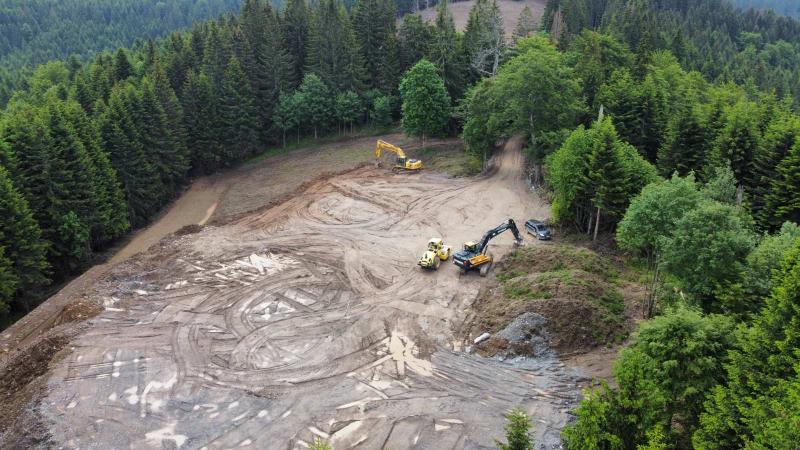
Kubat explains that reforestation is currently funded from the revenues generated by users of state forests (forestry companies - ŠPD) through the sale of forest wood products and other forest products. It is also financed from earmarked funds collected in special accounts of cantonal budgets based on various fees defined by applicable cantonal forestry laws.
"I believe it is essential to increase control over the expenditure of earmarked funds so that logging and reforestation are in equal proportions (at the very least). This is not the case in Bosnia and Herzegovina at present. This is also a huge problem, and I think we should revive worker reforestation campaigns and school projects where for every tree cut down (like sanitary logging), at least two should be planted. The European practice suggests that for every structure, there should be a corresponding amount of shade (canopy) provided by trees. Logging in urban areas is particularly problematic because, in cities, literally every tree is a life source. For instance, we currently have a situation in Zenica at Trg Rudara, where relocating existing trees that have taken up to 100 years to grow poses significant challenges, especially in cities with high air pollution", concludes Kubat.
(zurnal.info)





